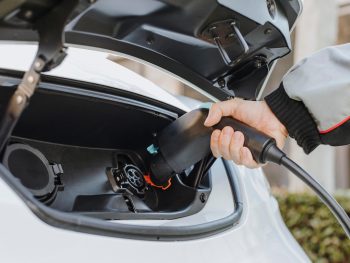Government to remove barriers to 4.25-tonne electric van take-up
The Government is planning to remove some long-standing barriers to fleet usage of 4.25-tonne electric vans, supporting accelerated adoption by operators.

Changes include dropping training requirements and revising towing allowances for heavier electric vans
Following last year’s consultation, the Office of Zero Emission Vehicles (OZEV) has proposed four changes to legislation for heavier vans – including dropping training requirements and revising towing allowances.
The move comes after reports that ongoing confusion over requirements was discouraging fleets from deploying electric vans and actually leading to cancelled orders.
Such vehicles already benefit from a gross vehicle weight derogation that enables individuals with a Category B (passenger car) licence to drive them.
However, such licence holders must still undertake five hours of additional training before being permitted to operate alternatively fuelled vans weighing between 3,500kg and 4,250kg on public roads. This requirement does not apply to equivalent ICE vans, which fall under the 3,500kg threshold.
OZEV has now said it’s looking to remove the training requirement; a move supported by 72% of respondents to the consultation.
It’s also planning to align the towing capacity for an electric van driver with the new car and trailer regulations.
Other planned changes include expanding the legislation from just goods vehicles currently to cover all vehicles eligible to be driven on a standard licence – for example, minibuses.
And OZEV has also said it will look to change the types of powertrains eligible for the derogation, from alternatively fuelled to zero emission vehicles only. The current licence flexibility legislation defines ‘alternative fuel’ as electricity, natural gas, biogas, hydrogen and hydrogen and electricity (hybrid), but not all of these are zero emission at the tailpipe.
The changes come after the Association of Fleet Professionals (AFP) warned that its members were cancelling orders for 4.25-tonne vans due to concerns that they may find themselves inadvertently breaking the law if they simply treat them like a 3.5-tonne diesel van.
Change to support ZEV uptake, says BVRLA
The BVRLA welcomed the Government’s acknowledgment that zero-emission commercial vehicles require dedicated attention and said it was a positive step in seeing more movement in this space.
Gerry Keaney, BVRLA chief executive, added: “Zero-emission motoring requires a fresh approach. Electric van users have bespoke needs and face too many barriers that are restricting adoption. Today’s announcement shows that the government is listening. These changes will bring greater flexibility and support more van operators in making the switch to greener vehicles sooner.
“The BVRLA remains committed to driving more positive change in this space and has pushed for the MOT regime to consider similar flexibilities for heavier zero-emission vans. Our work with partner associations is accelerating to make sure all levels of Government understand the need for renewed focus on the transition to ZEV vans.”
Take action to avoid electric van licensing confusion, says Red Corporate Driver Training
Red Corporate Driver Training however is urging fleets to bypass confusion over electric van licensing by training drivers to lorry standards instead.
It believes that the confusion over the licensing requirements for electric vans shows the need for a more considered fleet driver training policy to ensure road safety standards are maintained as vehicle weights spiral upwards.
But Red warns that the changes mean drivers will be allowed to drive a vehicle combination of up to seven tonnes, and several metres in length, without mandated training.
It’s also pointed out that several questions, already raised by the AFP, remain unanswered, including:
- Do these vehicles need a tachograph and 60mph speed limiter?
- What is the rule on driver hours?
- Do drivers need a CPC (Certificate of Professional Competence) if they are travelling more than 100km (62 miles) from their depot?
CEO Seb Goldin said: “This is yet another example of government taking away established safety protocols to suit a particular agenda, in this case driving demand for EVs.
“Safety should not be something that can be dropped when it doesn’t suit – the thought of a newly qualified car driver being handed the keys to a big electric van with a large trailer on the back is frightening. It’s not just about being eligible – the question should be are they experienced and knowledgeable enough to drive it.”
Goldin said businesses should assess what vehicles their employees will be driving over the next few years and take action to ensure the risk to their fleet and other road users is managed as electric commercial vehicles go beyond 4.25 tonnes.
He added: “These EV panel vans are heavy already and it won’t be long before electric vans weigh more than 4.25 tonnes because they will need extra battery packs to make them commercially viable to businesses.
“The best solution is for businesses to assess their drivers and put those eligible forward for the more encompassing C1 training, which allows employees to drive vehicles up to 7.5 tonnes GVW.
Goldin added: “Putting drivers through C1 training opens up a host of new options for businesses and also future-proofs its operations and commercial vehicle procurement range for that extra investment.
“It will give them a fleet of drivers qualified to safely and economically drive a fleet of vehicles up to 7.5 tonnes.
“This will allow businesses to be more flexible in their operations, countering driver absences and being prepared to adapt working practices if a new contract demands it.”
He summed up: “Businesses are looking at a period of huge change in the years ahead as we transition to more EVs on fleet, so it makes sense to get ahead of the game and future-proof as much of your operation as you can.”
The full outcome to the consultation is online here.

